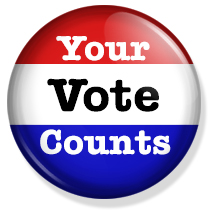
I haven’t heard them all, but I’ve heard most of them—excuses for not voting:
“What difference does it make, they’re all crooks?”
“I’m tired of voting for the lesser of two evils.”
“I’m gonna show ‘em. I’m not gonna vote for either candidate.”
“My guy lost in the primary and I don’t like the guy who won the nomination so I’m not gonna vote.”
And my favorite,
“I’m not the voting kind. Politics is too controversial and I don’t want to get involved.”
Someone actually told me that a few years ago when I was campaigning for a very good candidate. I was about to respond in an attempt to persuade him to reconsider when I thought, “How can I possibly argue with the logic of worrying that your political preference would stir controversy when no one knows how you voted?”
And with that type of logic, if he did go to the polls, he would undoubtedly have too little information to vote intelligently. So I just said ‘thank you’ and moved on.
Each excuse for not voting may address a different aspect of our current political atmosphere, yet they all share the same illogical thought process that ignores the basic fact that not voting is not only a non-solution to existing problems it most likely will create new ones.
Not voting is also a slap in the face to all the veterans who have served our country. Some fought, some died, and all made tremendous sacrifices to guarantee, among other things, our freedom to vote.
That freedom has often been used to serve special interests, as opposed to the best interests of our nation. Yet rather than being a deterrent to participate in the process, abuses resulting from an electorate who put corrupt, self-serving or incompetent people in office point directly to voters who were too lazy or too apathetic to go to the polls.
The genesis of ill-advised or counter-productive legislation is often a group of zealots who rally around a cause and politicians who support that cause. And with the majority of moderate voters uninvolved and disinterested, legislation that most people don’t want is often passed into law—primarily because a sufficient number of voters didn’t bother to vote for candidates who were opposed the legislation.
Officials who vote for counter-productive legislation are often voted out of office. But not always. If nothing else, that should serve as sufficient incentive to become an informed voter and most importantly to exercise your right to vote.


Leave a Reply
You must be logged in to post a comment.